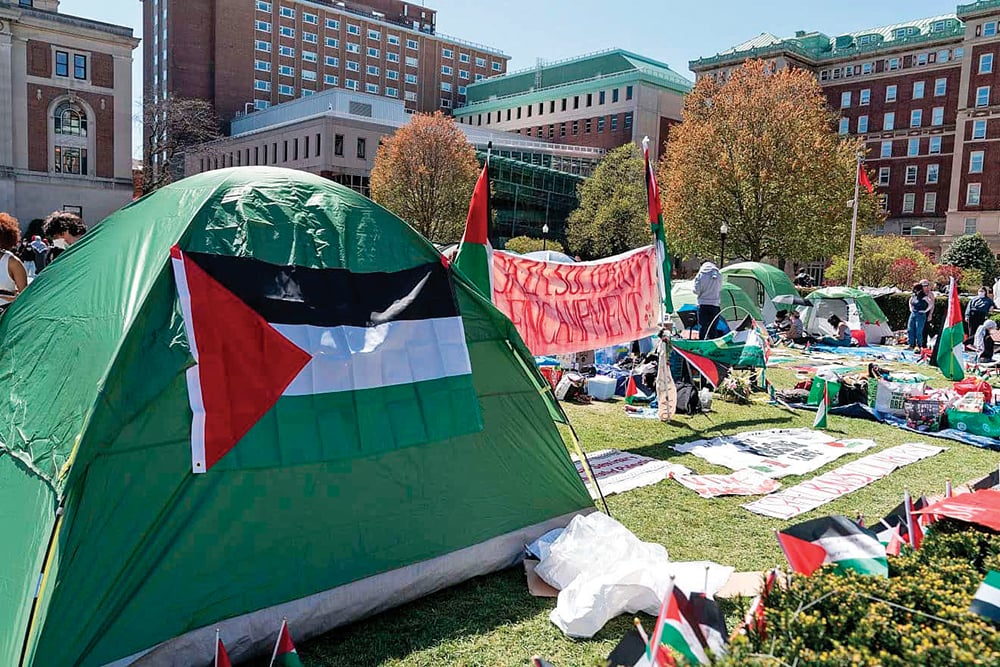
In a letter to the class of 2024, Columbia University announced that it will be canceling its upcoming commencement ceremony on May 15 due to the ongoing protests on its Morningside Heights campus. Following weeks of pro-Palestinian rallies and encampments on the south lawn — all of which has been fraught with antisemitic speech and actions targeting Jewish students — the commencement cancellation saves President Nemat “Minouche” Shafik from having to address the disruptions in her speech to the graduating class.
In a statement on May 6, Columbia officials noted that the past few weeks had been “incredibly difficult” and students “emphasized that smaller-scale, school-based celebrations are the most meaningful.” The announcement came after armed police officers dismantled a student occupation of Hamilton Hall and cleared the remaining pro-Palestinian encampments on April 30, during which a total of 112 arrests were made. According to the office of Mayor Eric Adams and NYPD Commissioner Edward Caban, approximately a third of the protestors who were arrested were not affiliated with Columbia in any way.
“We will not be a city of lawlessness, and we will not allow our youth to be influenced by those who have no goal other than spreading hate and wreaking havoc on our city,” Adams wrote in an official statement. “As the anti-Israel protests began to escalate, it became abundantly clear that individuals unaffiliated with these schools had entered these different campuses and, in some cases, were even training students in unlawful protest tactics, many which we witnessed escalating into violent conduct … Free speech and peaceful protest remain the fabric of our society, but that is not what we have been witnessing on these campuses.”
The protests at Columbia University began in mid-April and were initially organized by student groups calling on the school to cut all ties with Israel. However, as these protests proliferated on campus, Jewish students reported that their safety had felt threatened specifically in regard to targeted harassment and violence simply due to their religion and ethnicity.
A report written by the student journalists at the Columbia Daily Spectator, published later in New York Magazine, surveyed those on campus who have been affected by the protests. While the vast majority of students interviewed were supportive of the encampments and the actions of the protestors, the Daily Spectator captured some of the troubling sentiments of the Jewish students.
Columbia freshman Rachel Freilich told the Daily Spectator that she would tuck in her Bring Them Home necklace as well as her Magen David when walking around campus, noting that she “didn’t want to get harassed, and didn’t want to get hurt.” She added, “It felt like I had to hide an integral part of who I am.” Similarly, freshman Parker De Deker reported that “antisemitism was rapidly increasing at a rate I had never seen before on our campus,” recalling the verbal harassment he received while walking to the Chabad on campus and wearing a kippah.
“What we are witnessing in and around campus is terrible and tragic,’’wrote Rabbi Eli Buechler, director of OU-JLIC at Columbia, on April 21. “The events of the last few days, especially [April 20], have made it clear that Columbia University’s Public Safety and the (New York Police Department) cannot guarantee Jewish students’ safety in the face of extreme antisemitism and anarchy.’’ In the same letter, Buechler urged Jewish students to go home to avoid the rampant hate on campus.
In his official statement ahead of Passover, on the same day as Buechler’s letter, President Joe Biden directly acknowledged the protests and the impact it has had on Jewish students at Columbia. “Silence is complicity,” Biden’s statement read. “Even in recent days, we’ve seen harassment and calls for violence against Jews. This blatant antisemitism is reprehensible and dangerous — and it has absolutely no place on college campuses, or anywhere in our country.”
The White House also put out a statement of its own, condemning the violence and “physical intimidation targeting Jewish students and the Jewish community” on Columbia’s campus.
On April 29, a complaint filed on behalf of Jewish students at Columbia requested an emergency injunction requiring university trustees to better enforce the school’s code of conduct to allow class members to safely complete the semester in person.
“Indeed, despite its supposed commitment to diversity, equity and inclusion, Columbia has allowed a small group of fringe demonstrators to target Jewish students and faculty with harassment, hate speech and violence for the sole reason that they are (or appear to be) Jewish. Columbia’s inaction and willingness to allow for such vile conduct is antithetical to fostering an environment of diversity, equity and inclusion,” read the complaint.
That same day, the pro-Palestinian protestors seized Hamilton Hall, prompting Shafik to call in the NYPD and have them cleared out from the building. On April 30, the 112 arrests on campus were made. “After the university learned overnight that Hamilton Hall had been occupied, vandalized and blockaded, we were left with no choice,” Columbia said in a statement. “The decision to reach out to the NYPD was in response to the actions of the protesters, not the cause they are championing. We have made it clear that the life of campus cannot be endlessly interrupted by protesters who violate the rules and the law.”
Since those arrests were made, the university formally requested that NYPD officers maintain a presence on campus through May 17, the end of Columbia’s commencement events. Until then, the safety of Jewish students remains uncertain as Columbia continues to grapple with its own failures in dealing with these protestors.
Channa Fischer is a staff writer at The Jewish Link.











